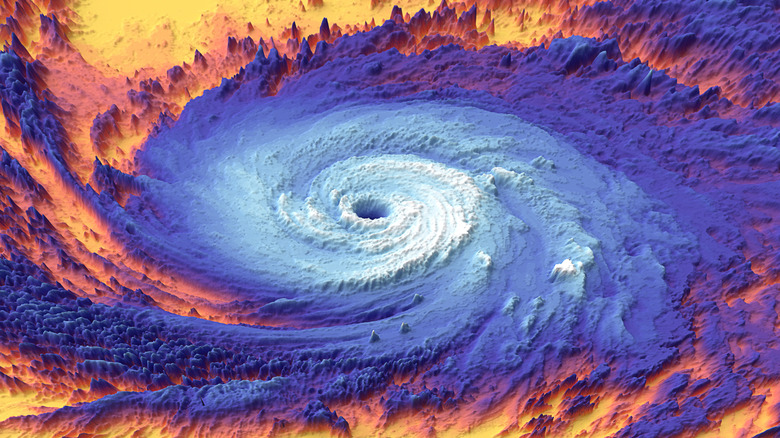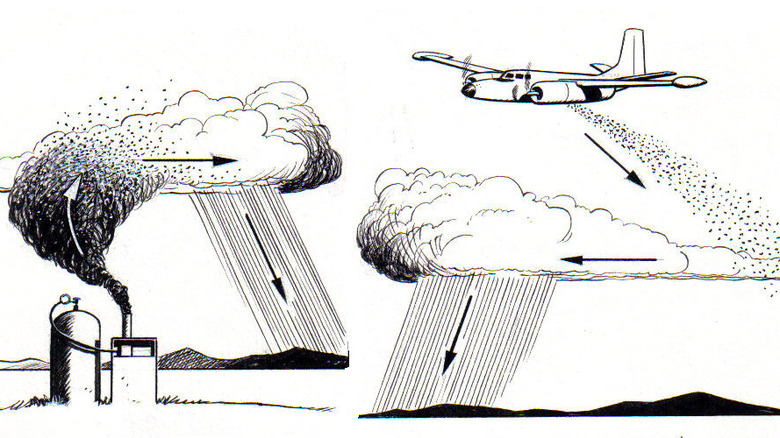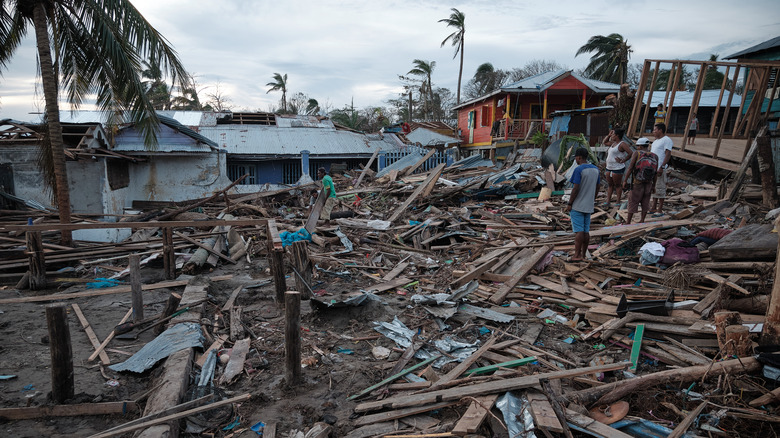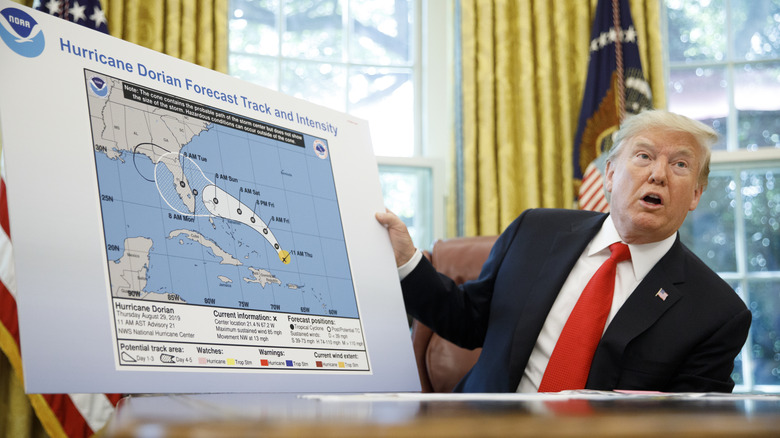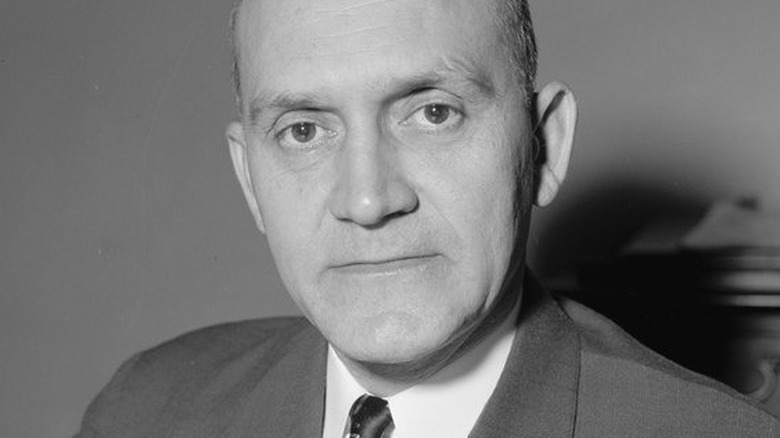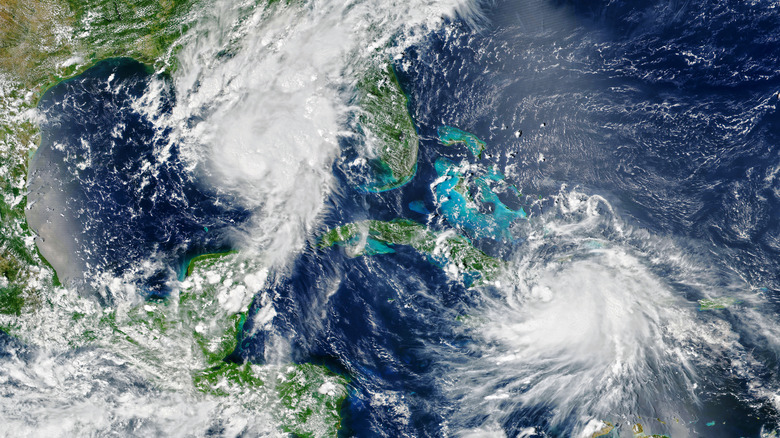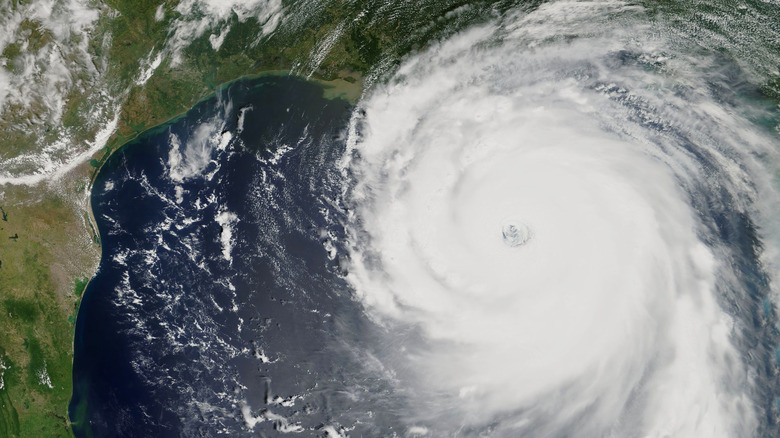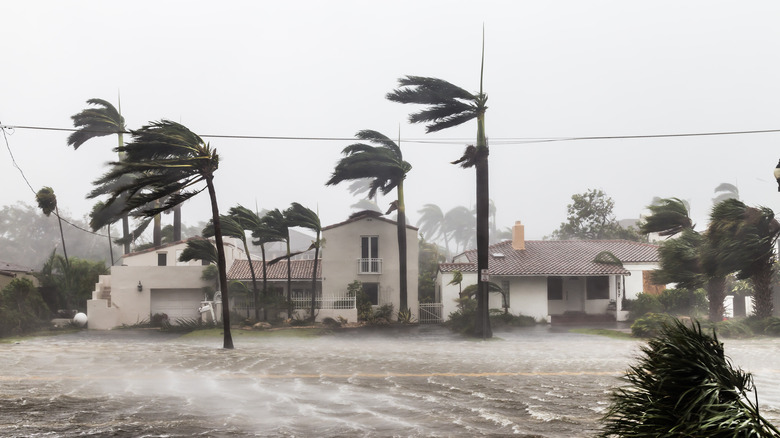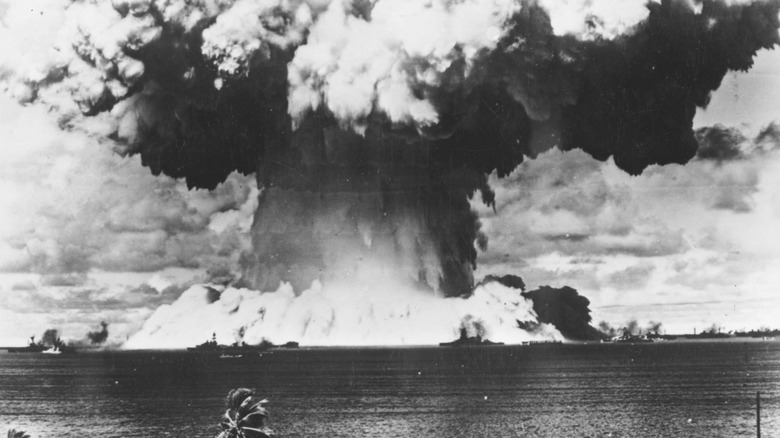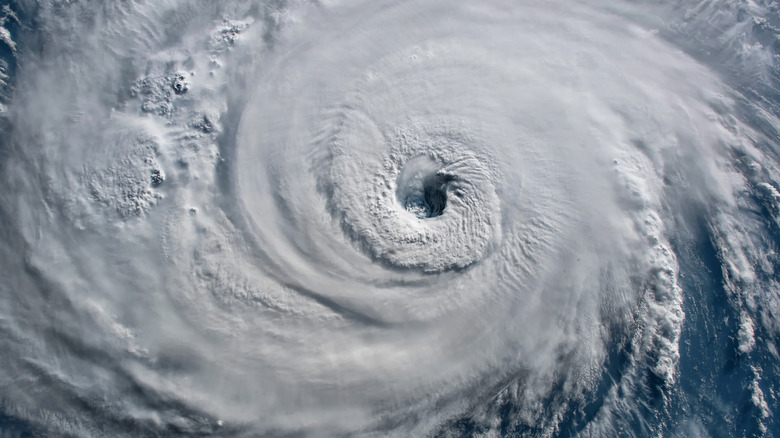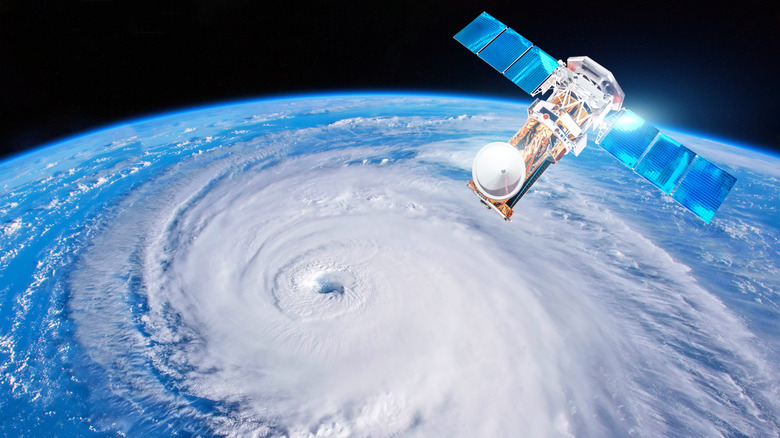Here's What Would Happen If You Nuked A Hurricane
Hurricanes are some of the scariest, deadliest, most costly weather events on Earth. The destruction hurricanes leave in their wake is epic. Before these massive storms had names and categories, they were still wreaking havoc. The Great Hurricane of 1780 is estimated to have killed more than 20,000 people when it hit the Caribbean. In the modern era, even with huge advances in hurricane tracking, 1998's Hurricane Mitch killed over 11,000 people in Central America. Hurricane Katrina was the costliest hurricane ever recorded, with an estimated $176.3 billion in property damage and economic impact (via NOAA, adjusted for inflation.) And even hurricanes that don't post numbers like those ruin lives.
But what if we could stop a hurricane in its tracks? What if we recreated the film "Armageddon," but instead of an asteroid, it was a massive storm; instead of Ben Affleck, it was just some guy; and instead of a nuclear bomb it was ... actually, no, it would still be a nuclear bomb.
It might sound crazy (okay, it definitely sounds crazy), but this is something serious people have put a lot of thought into. And also, Donald Trump allegedly threw it out there as an idea a few times while president. But is this something humanity might actually try one day? And would it even work? Here's what would happen if you nuked a hurricane.
How we've tried in the past
Humans have always wanted to control the weather, even if that just meant praying to a god for rain. But after defeating the Nazis and inventing the atom bomb, scientists seemed to think anything was possible, including controlling the weather. After World War II, they started trying in a big way.
What better weather to try to alter than hurricanes? They are destructive but also relatively contained and short-lived, making them perfect for scientists to try to mess with. And mess they did. Through the decades, the National Oceanic and Atmospheric Administration (NOAA) reports that researchers tried a laundry list of ways to stop hurricanes, including "seeding clouds with dry ice or silver iodide, reducing evaporation from the ocean surface with thin-layers of polymers, cooling the ocean with cryogenic material or icebergs, changing the radiational balance in the hurricane environment by absorption of sunlight with carbon black, flying jets clockwise in the eyewall to reverse the flow, exploding the hurricane apart with hydrogen bombs, and blowing the storm away from land with giant fans, etc."
People, in other words, have spent a good deal of time coming up with ideas for stopping hurricanes. Even the U.S. government got involved in a big way. For over 20 years, from 1962 to 1983, the fabulously named Project STORMFURY used simulations, as well as four actual hurricanes as test subjects, to see if cloud seeding with silver iodine would reduce a major storm even a little.
Spoiler alert: It didn't.
Hurricanes are getting worse in every way
If it feels like there are more hurricanes these days than there were when you were a kid, and that they cause more damage, that's not you looking back on the past with rose-colored glasses. Hurricanes are definitely worse than they used to be. And the best part is, it's all humanity's fault. Yup, we can thank climate change for deadlier hurricanes.
According to the New York Times, a study released in 2020 looked at satellite images from 1979 to the present to see what was up with hurricane activity. It found that every 10 years for the past four decades, "the likelihood of a hurricane developing into a major one of Category 3 or higher, with sustained winds greater than 110 miles an hour, [increased] by about 8% a decade." Kerry Emanuel, a hurricane expert at the Massachusetts Institute of Technology, said, "When you see things going up all over the globe like that, the ducks are kind of in order." That's scientist talk for "We are so screwed." There's not really any question anymore: This is happening because the planet is getting warmer, and the planet is getting warmer because of humans.
James P. Kossin, a researcher with the National Oceanic and Atmospheric Administration who was part of the study, says flat out, "We're making these storms more deleterious." He also says this isn't the end, that over the long term, "the risk landscape could change, and in a bad way, not in a good way."
How Donald Trump wanted to deal with hurricanes
The elephant in the room here is that, according to a report by Axios (via GQ), while he was president of the United States and the man with his finger on the red button, Donald Trump asked why he couldn't just nuke a hurricane. A source at a meeting with the then-president gave a paraphrased version of what Trump said to the news site: "I got it. I got it. Why don't we nuke them? They start forming off the coast of Africa, as they're moving across the Atlantic, we drop a bomb inside the eye of the hurricane and it disrupts it. Why can't we do that?" Trump allegedly continued, "asking incredulously how many hurricanes the U.S. could handle." (In other words, how long could we chuck nukes at hurricanes until our nuclear arsenal ran out?)
"You could hear a gnat fart in that meeting," the source told Axios. "People were astonished. After the meeting ended, we thought, 'What the f*ck? What do we do with this?'" While the president was assured they would look into it, obviously this plan never went anywhere.
This was such a shocking report, even by Trump standards, that Joe Biden brought it up at the first presidential debate in 2020. Biden said Trump, "has an answer for hurricanes. He said, 'Maybe we should drop a nuclear weapon on them.'" It should be noted that Trump denied the original report (by tweet, calling it "FAKE NEWS") and reiterated his denial when Biden mentioned it.
More people want to do it than you'd think
For many people, the fact that Donald Trump thought nuking hurricanes would be a good idea automatically means it must be insane. And, for reasons we'll get into, it would be. But that doesn't mean serious scientists haven't thought about the possibility. Not even mad scientists, but respected ones.
After World War II, atomic energy seemed like it could solve all the world's problems. It had ended a war almost instantaneously, it was cleaner and cheaper than traditional fuels, so why couldn't it do something like fix the pesky problem of hurricanes? National Geographic says it was a meteorologist named Jack W. Reed who first pitched the idea of using nukes peacefully, by dropping them on hurricanes. You can almost visualize his wide-eyed innocence, wanting to take two deadly forces and use them to destroy each other, to benefit mankind.
The head of the U.S. Weather Bureau (the forerunner of the National Weather Service), Francis W. Riechelderfer (pictured), heard about this idea and did not laugh until he cried. Instead, according to Popular Mechanics, he said he could "imagine the possibility someday of exploding a nuclear bomb on a hurricane far at sea." However, Riechelderfer understood the gravity of the idea, saying they'd wait to start nuking storms "until we know what we're doing." NOAA says the idea is still popular, noting on their official website, "During each hurricane season, there always appear suggestions that one should simply use nuclear weapons to try and destroy the storms."
Picking the right one
We know that there are more deadly hurricanes now than there used to be, but they don't start out that way. Even the mightiest hurricane begins life as a much smaller storm. Those storms don't even get names, so they can't be that big a deal. Obviously, the answer is to nuke them when they are still small and not an issue. Don't take any chances. Problem solved, right?
It turns out, you'd need a lot of nukes and a lot of power. Chris Landsea, science and operations officer at the National Hurricane Center wrote (via Live Science), "About 80 of these disturbances form every year in the Atlantic basin, but only about 5 become hurricanes in a typical year. There is no way to tell in advance which ones will develop." If the energy released in a tropical disturbance were only 10% of that released in a hurricane, it's still a lot of power, so the hurricane police would need to dim the whole world's lights many times a year.
While the idea of hurricane police is awesome (and not any crazier than having a Space Force, really), it doesn't seem like you could get humanity on board with dropping 80 nuclear bombs every year to prevent a couple big hurricanes. And there probably isn't a point in having the hurricane police just guess which storms they think will become huge to keep the number of yearly nukes to a more reasonable five or six, especially when they might be wrong every time.
The amount of energy required is absurd
Okay, so it would be complicated, but surely if legitimate scientists have thought about nuking a hurricane, it must be worth it to at least try? The problem is, we already know there would be no point. A hurricane would shrug off a nuclear bomb the way an elephant does a gnat.
There's a lot of numbers involved, so let's have the experts at NOAA explain it: "A fully developed hurricane can release heat energy at a rate of 5 to 20×1013 watts and converts less than 10% of the heat into the mechanical energy of the wind. The heat release is equivalent to a 10-megaton nuclear bomb exploding every 20 minutes. According to the 1993 World Almanac, the entire human race used energy at a rate of 1013 watts in 1990, a rate less than 20% of the power of a hurricane."
That is a lot of energy. And that's just one hurricane. Now imagine the energy required to stop five or six a year, every year. Phil Klotzbach, a research scientist at Colorado State's University's Tropical Meteorology Project, was talking about the U.S. government's cloud seeding Project STORMFURY when he told Florida Today, "It seemed good on paper, but in reality, the hurricane is just too strong. They're so huge, they're so powerful." But it would be the same problem with nukes. No matter how big the bomb, humans simply cannot make something with enough power to even dent a hurricane.
Nuclear bombs can't move enough air around
Nuclear bombs aren't powerful enough to stop a hurricane, and part of that is because they don't even do the thing you'd most need to slow the storm down. Hurricanes cause destruction in lots of ways, but the big one is wind. The flooding they cause is also terrible and deadly, but at least the law of gravitation means that the water stays by the ground. You know your house will flood from the bottom up. But the winds of a hurricane can destroy anything, on any level. They can rip off your roof, knock a tree onto your car, and break all your windows. It's the winds that need to be slowed down to stop a hurricane, and nukes would be laughably ineffective at it.
Meteorologist Chris Landsea of the National Hurricane Center explains (via Popular Mechanics) "To change a Category 5 hurricane into a Category 2 hurricane you would have to add about a half ton of air for each square meter inside the eye, or a total of a bit more than half a billion (500,000,000) tons for a 20 km radius eye. It's difficult to envision a practical way of moving that much air around."
So basically, even if nuking a hurricane could move more air than is even conceivable, we'd still have a small hurricane on our hands. And it's not possible anyway, since nukes are not giant, cutting-edge fans. Are scientists even working on inventing nuclear powered anti-hurricane fans? Probably not. Slackers.
Nuclear fallout would cause more problems
The most obvious concern when it comes to nuking a hurricane, of course, is nuclear fallout. As humans learned over the last century from a wide variety of incidents, fallout is no fun. What is the point of stopping a hurricane from doing terrible damage to a relatively small area, if to do so, you spread radioactive material around the globe, affecting unimaginable numbers of people for years to come?
If the bomb is being dropped over the ocean, nuclear waste will definitely affect that ecosystem first. We've had examples of it before. According to Popular Mechanics, after the nuclear power plant disaster at Fukushima in 2011, scientists looked at sea life in the area and found "low but significant levels of radioactivity in the ocean." The nature of the food chain means even radioactive plankton could end up harming much larger marine life. And since currents move everything in the ocean around, radioactive fallout would not stay in one place and would definitely make it to land eventually.
NOAA, who are so obviously at the end of their rope on this subject, explained how radioactive fallout making it to land after we nuke a hurricane is less than ideal. "Apart from the fact that this might not even alter the storm, this approach neglects the problem that the released radioactive fallout would fairly quickly move with the tradewinds to affect land areas and cause devastating environmental problems," NOAA's hurricane page states. "Needless to say, this is not a good idea."
Something unexpected (and deadly) could happen
So scientists are pretty sure that nuking a hurricane would both do nothing to stop it and spread nuclear fallout around the globe. But scientists know they don't know everything — and that is even scarier. If we ever got desperate enough to try to nuke a hurricane and crossed our fingers that something unexpected would happen, we might be rather disappointed when that unexpected thing was a disaster we could never have predicted.
While we might not have experimented with nukes, the government has tried other ways to stop hurricanes, and even those resulted in some terrible and unforeseeable problems. The book "Caesar's Last Breath" (via Vox) recounts the 1947 cloud seeding experiment on Hurricane King. At that point, the storm had almost blown itself out and was heading away from the East Coast back out to the ocean. It seemed like a safe bet to test cloud seeding on the dying storm. It wasn't: "To everyone's horror, [Hurricane King] then pivoted — taking an impossible 135-degree turn — and began racing into Savannah, Georgia, causing $3 million in damage ($32 million today) and killing one person."
Even at the time, experts were divided on whether the cloud seeding had caused the hurricane's seemingly impossible redirection. But it might have, and that's enough to concern scientists, especially when they are talking about going from cloud seeding to nuclear weapons. There's just too much of a chance that the unknown could happen and result in an epic, deadly disaster.
Scientists say we'll never be able to stop hurricanes
Okay, so we can't use nukes, ice, cloud seeding, or anything humanity has invented — yet. But come on. Humans have done supposedly impossible things before. We've been to the Moon! Maybe a bigger nuke could stop a hurricane? And we could make it not deadly, somehow? Surely anything is possible if we put our minds to it, right, scientists?
"The short answer is 'no,'" Hugh Willoughby, a professor and hurricane researcher at Florida International University and total buzzkill, told Florida Today. "As far as I know, there's no serious scientist doing this at all. It's very unpromising."
Still, we shouldn't stop people from dreaming. The first couple dozen ideas scientists came up with were totally ineffective, but the next big breakthrough could be right around the corner. Surely NOAA would tell people to dream big? Well, sort of. You just might not be prepared for how big you will need to be dreaming. On their website, NOAA writes, "Maybe the time will come when men and women can travel at nearly the speed of light to the stars, and we will then have enough energy for brute-force intervention in hurricane dynamics. Until then, perhaps the best solution is ... just learn to co-exist with them."
There you have it. Once we figure out how to almost break the laws of physics, we might be able to stop hurricanes. Of course, at that point, it might be easier to just leave Earth behind completely.
